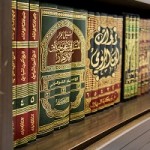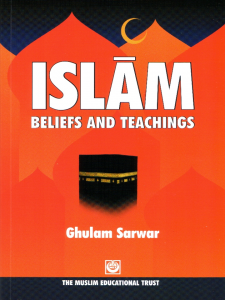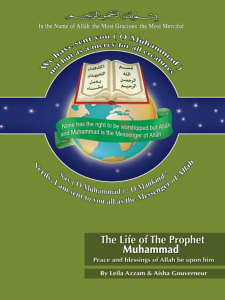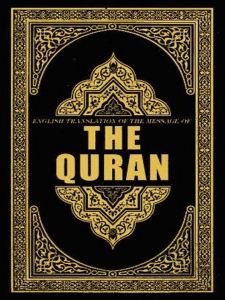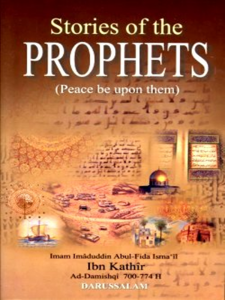“And among His signs is this, that He created for you mates from among yourselves, that you may dwell in peace and tranquility with them, and He has put love and mercy between your (hearts): Verily in that are signs for those who reflect” (Quran 30:21).
“O Humans revere your Guardian Lord, who created you from a single person created of like nature its mate, and from this scattered (like seeds) countless men and women. Reverence Allah through Whom you claim your mutual rights” (Quran 4:1).
The above verses of the Quran lay out the framework for the basis and objectives of marriage in Islam. In the ultimate Wisdom of Allah SWT, we are first told that both partners, man and woman, are created from the same source and that this should be paid attention to as it is one of His Signs.
The fact that we come from the same soul signifies our equality as humans. When the essence of our creation is the same, the argument of who is better or greater is redundant. To stress on this fact, and then to talk about marriage in the same verse, is of great significance for those of us who are in the field of marriage counseling. A shift in this attitude of gender equality as human beings causes an imbalance in marital relationships leading to dysfunctional marriages. Whenever one party considers that they are superior or above the law there is a power shift which may subsequently lead to misuse or abuse of that power. As a result, the less valuable partner is seen as an easy prey. Many marital difficulties are based on, or caused by, control and rule stratagem.
By stressing on the equality of all humans, men or women, and making it the basis of marriage, Allah SWT, in His Infinite Wisdom, has laid the ground rules for establishing peace. He has assigned different roles to husband and wife as functional strategy, rather than as a question of competence as humans.
Prophet Mohammad (PBUH) has stated that: “men and women are twin halves of each other” (Bukhari). This narration also brings home the fact that men and women are created from a single source. Furthermore, by using the analogy of twin half, the Prophet (PBUH) has underlined the reciprocal and interdependent nature of men and women’s relationships.
The objective of marriage, according to the above Quranic verses, is to enable us to dwell in peace and tranquility. It is important for us to reflect on these words and their significance in the Islamic frame of reference.
In order to have peace certain condition must be met. These prerequisites to peace are Justice, Fairness, Equity, Equality, and fulfillment of mutual rights. Therefore, any injustice whether it is oppression, or persecution, cannot be tolerated if there is to be peace in Muslim homes.
In the domestic realm, oppression is manifested when the process of Shura (consultation) is compromised, neglected or ignored. When one partner (in most cases the husband) makes unilateral decisions and applies a dictatorial style of leadership, peace is compromised. Persecution is present when there is any form of domestic abuse being perpetrated.
Tranquility on the other hand is a state of being which is achieved when peace has been established. Tranquility is compromised when there is tension, stress and anger. It is a mistake to take tranquility to mean perpetual state of bliss, since being a Muslim does not make one immune to tragedies and catastrophes. In fact, God tells us repeatedly in the Quran that a believer will be tried and tested. However, a state of tranquility empowers one to handle difficult moments with their spouses as obedient servants of God. God, in His infinite Mercy, also provides us with the tools by which we can achieve this state of peace and tranquility.
The second principle on which Islamic family life is based is Rahma, meaning mercy. As mentioned in the above verse, God tells us that it is He that has placed mercy between the hearts of spouses. We are therefore inclined by our very nature to have mercy for each other. Mercy is manifested through compassion, forgiveness, care and humility.
It is obvious that these are all ingredients that make for a successful partnership. Marriage in Islam is above all a partnership based on equality of partners and specification of roles. Lack of mercy in a marriage, or in a family, renders it in Islamic terms dysfunctional.
Allah SWT further states that He has also placed in addition to mercy, love between spouses. It should be noted, however, that the Islamic concept of love is different from the more commonly understood romantic love that has become so valued.
The basic difference is that love between man and woman in the Islamic context can only be realized and expressed in a legal marriage. In order to develop a healthy avenue for the expression of love between a man and woman, and to provide security so that such a loving relationship can flourish, it is necessary to give it the protection of Shariah (Islamic law).
Marital love in Islam inculcates the following:
Faith: The love Muslim spouses have for each other should be for the sake of Allah and to gain His pleasure. It is from Allah that we claim our mutual rights (Quran 4:1) and it is to Allah that we are accountable for our behavior as husbands and wives.
It sustains: Love is not to consume but to sustain. Allah expresses His love for us by providing sustenance. To love in Islam is to sustain our loved one physically, emotionally, spiritually and intellectually, to the best of our ability. (Note: To sustain materially is the husband’s duty. However, if the wife wishes she can also contribute)
Accepts: To love someone is to accept them for who they are. It is selfishness to try and mold someone as we wish them to be. True love does not attempt to crush individuality or control personal differences, but is magnanimous and secure to accommodate differences.
Challenges: Love challenges us to be all we can, it encourages us to tap into our talents and it takes pride in our achievements. To enable our loved one to realize their potential is the most rewarding experience.
Merciful: Mercy compels us to love and love compels us to have mercy. In the Islamic context the two are synonymous. The attribute Allah SWT chose to be the supreme for Himself is that He is the most Merciful. This attribute of Rahman (the Merciful) is mentioned 170 times in the Quran, emphasizing the significance for believers to be merciful. Mercy, in practical application, means to have and show compassion and to be charitable.
Forgiving: Love is never too proud to seek forgiveness or too stingy to forgive. It is willing to let go of hurt and letdowns. Forgiveness allows us the opportunity to improve and correct ourselves. Islam emphasizes the principle that if we want God to forgive our mistakes, then we should be forgiving of others too.
Respect: To love is to respect and value the person, their contributions, and their opinions. Respect does not allow us to take for granted our loved ones or to ignore their input. How we interact with our spouses reflects whether we respect them or not.
Confidentiality: Trust is the most essential ingredient of love. When trust is betrayed and confidentiality compromised, love loses its soul.
Caring: Love fosters a deep fondness that dictates caring and sharing in all that we do. The needs of our loved ones take precedence over our own.
Kindness: The biography of the Prophet Muhammad (PBUH) is rich with examples of acts of kindness he showed towards his family and particularly his wives. Even when his patience was tried, he was never unkind in word or deed. To love is to be kind.
Grows: Marital love is not static, for it grows and flourishes with each day of marital life. It requires work and commitment, and is nourished through faith when we are thankful and appreciative of Allah SWT blessings.
Enhances: Love enhances our image and beautifies our world. It provides emotional security and physical wellbeing.
Selflessness: Love gives unconditionally and protects dutifully.
Truthful: Love is honesty without cruelty and loyalty without compromise.
Importance of Marriage:
Marriage is a sacred social contract between a man and a woman. Like all great religions, Islam also emphasizes the institution of marriage. God says in the Holy Quran: “And among His Signs is this, that He created for you mates from among yourselves, that ye may dwell in tranquility with them, and He has put love and mercy between your (hearts): verily in that are Signs for those who reflect.” (30:21)
In addition, the Quran beautifully describes the depth of a marital relationship by invoking the metaphor of “garments” for the husband and wife: “They are your garments and you are their garments.” (2:187) Moreover, Prophet Muhammad (PBUH) has specifically mentioned marriage to be of his traditions and even equated it to completing half of one’s faith.
The Process of Marriage:
While the concept of dating does not exist in Islam and intercourse prior to marriage is prohibited, the Islamic notion of marriage recognizes the need to determine compatibility between future spouses. For instance, when marrying their eldest daughter, Sarah, the Siddiq made sure she and her suitor were given an opportunity to speak with one another with moderated supervision before either side made a commitment. Once they were engaged, the two continued a dialogue via phone and email.
Spouses are selected in different ways. Some marriages, like Sarah’s, are “arranged.” Other individuals find their own partners through interaction with each other, as in the case of Muhammad Uthman and his wife, Eman, who met on campus and took a liking for one another. Through it all, the focus is on the immediate goal of marriage. In this way, Islam strives to keep the spirit of matrimony alive: a union not only of two distinct persons, but their diverse viewpoints, their unique backgrounds and their extended families as well; a pledge to interweave their hitherto autonomous lives, hopefully successfully, and to continue the legacy onward.
Contrary to popular beliefs, Islam does not avow forced marriages irrespective of the gender; in fact, a marriage is incomplete without express approval by both the bride and groom. In practice, arranged marriages in Islam refer to the process where a third party introduces two families with children of marriageable age.
Weddings are festive occasions involving family and friends and may last for several days, depending on one’s culture. Yet, the essence of marriage lies in the nuptial contract signed by both the bride and groom after verbal affirmation to marry one another, which is overseen by two witnesses. This ceremony is called the “nikah” and it binds the two as husband and wife. An after-marriage feast called a “walima” is hosted by the husband, as was the custom of the Prophet Muhammad (PBUH).
Carrying the Legacy Forward:
Having children is often the natural next step for many Muslim couples although some choose to wait a few years before conceiving whereas others are unable to do so – as is pretty much the case with people all over the world. Naming the child can become a family affair with the involvement of grandparents at times, whereas some couples opt to name their own children. On the seventh day after the child is born, a religious sacrifice of slaughtering is performed and the baby’s head is shaved, giving the monetary equivalence of the weight of his/her hair in charity. This ceremony, called an “aqeeqah,” may instead be conducted on the 14th, 21st, 28th (etc.) day of the baby’s birth.
Marriage Related Topics:
Interestingly, the convention to change one’s name to their husband’s continues to exist in many Muslim countries, but practicing American Muslim women are increasingly choosing to keep their maiden names, understanding that no matter who they marry, they will foremost be their father’s daughters. They take their cue from the following words of the Prophet Muhammad (PBUH): “You will be called on the Day of Resurrection by your names and the names of your fathers…” The women at the time of the Prophet (PBUH), including his own wives, were all known by the names of their fathers, not their husbands. Following this tradition, Mary Kief decided to keep her last name after marriage without any objections from her husband.
Moreover, Islamically, the wife is free to keep her income since the husband is expected to provide for the upkeep of the home and family. In actuality, though, many couples maintain joint bank accounts and share the burdens of the home together. Divorce, while discouraged, is a social reality which is accepted and legalized. The wife or the husband may initiate the annulment process, which involves months-long negotiations with arbiters from both sides in the hopes of mending the relationship before a final decision is reached.
Homosexuality:
References to marriage within the Quran and sayings of the Prophet Muhammad (PBUH) are unmistakably heterosexual. In fact, homosexuality is strictly forbidden in Islam. The story of Lot is repeatedly mentioned in the Quran and the behavior of his people is termed indecent, excessively sinful, lewd, evil, and shameful. While Muslims do not discriminate against gays and lesbians as human beings, they detest their homosexuality as something which transgresses the bounds set by God from the beginning of time. In this vein, orthodox Christianity and Judaism continue to strongly condemn homosexuality as well.
Polygamy:
Although polygamy is practiced by a minority among Muslims, it is by no means the norm. Islam permits men to marry up to four wives at a time and this custom is more prevalent in some cultures than others. If a man chooses to have more than one wife, he must deal with all of them with justice. The Quran states: “…marry women of your choice, two or three or four; but if you fear that you shall not be able to deal justly (with them), then only one…” (4:3) Limitless polygamy has been practiced in a variety of cultures; however, Islam humanizes this practice with a limited allowance, recognizing a variety of factors, such as a higher ratio of women in certain countries, the toll of war and excessive male deaths in a society, and offering a legitimate and protective solution against the social evil of adultery.
